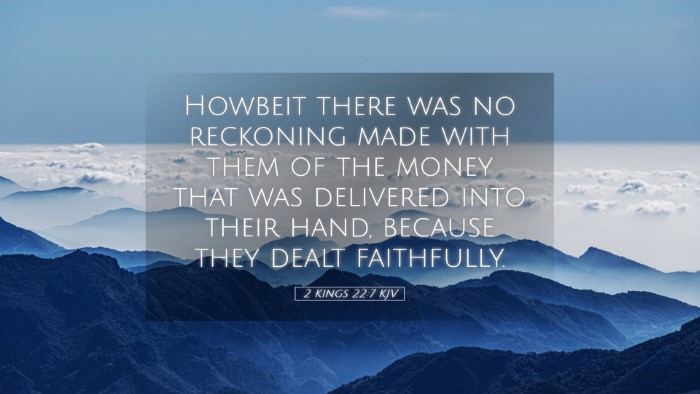Old Testament
Genesis Exodus Leviticus Numbers Deuteronomy Joshua Judges Ruth 1 Samuel 2 Samuel 1 Kings 2 Kings 1 Chronicles 2 Chronicles Ezra Nehemiah Esther Job Psalms Proverbs Ecclesiastes Song of Solomon Isaiah Jeremiah Lamentations Ezekiel Daniel Hosea Joel Amos Obadiah Jonah Micah Nahum Habakkuk Zephaniah Haggai Zechariah Malachi2 Kings 22:7
2 Kings 22:7 KJV
Howbeit there was no reckoning made with them of the money that was delivered into their hand, because they dealt faithfully.
2 Kings 22:7 Bible Commentary
Commentary on 2 Kings 22:7
Verse: "But they need not account with them for the money that was delivered into their hand, because they deal faithfully." (2 Kings 22:7, NKJV)
Introduction
This commentary examines 2 Kings 22:7, a verse that serves as an insightful reflection on accountability and integrity within the governance of the temple repairs under King Josiah. Such themes resonate profoundly in the contexts of pastoral ministry, theological study, and the ethical practice of stewardship.
Contextual Background
The narrative of 2 Kings is a continuation of the historical books of the Old Testament, chronicling the history of Israel and Judah. In chapter 22, we find Josiah, a king who deeply impacted Judah through religious reform. His discovery of the Book of the Law instigated a profound revival. Here, we focus specifically on the financial management of the temple funds, which is crucial as it reflects the character of those entrusted with sacred resources.
Key Insights
- Faithful Stewards: The verse highlights the trustworthy nature of the individuals handling the temple funds. The commentaries by Matthew Henry emphasize the importance of stewarding God’s resources with integrity and faithfulness. The phrase "they deal faithfully" suggests that their character is beyond reproach.
- Divine Expectations: Albert Barnes elaborates on God’s expectations for those in leadership roles, especially concerning financial matters. He argues that faithfulness is paramount, as those who are entrusted with overseeing financial responsibilities must reflect God's own nature of reliability.
- Accountability in Ministry: Adam Clarke notes that although these men were not required to account for the money, this does not imply a lack of accountability. Instead, their intrinsic honesty obviates the necessity for external checks. This principle encourages today's leaders to cultivate a reputation for integrity that minimizes the need for oversight.
Theological Reflections
From a theological perspective, this verse raises significant questions about stewardship and responsibility. The trust placed in the overseers echoes God’s trust in humanity since the creation narrative. Just as God expected Adam and Eve to steward the Garden of Eden, so does He expect His servants today to handle resources faithfully.
The implication of financial integrity extends beyond mere monetary transactions; it symbolizes a broader spiritual responsibility. The handling of funds can be seen as a microcosm of larger relational and moral responsibilities that a believer embodies.
Practical Applications
- Building Trust: Leaders in the church today must strive to build a reputation of trustworthiness that mirrors the faithful stewards depicted in this verse. This requires transparency, honesty, and a commitment to ethical practices in all financial dealings.
- Encouragement for Accountability: While the text shows that the stewards were trusted, churches should adopt practices that promote accountability without compromising trust. Regular financial reviews and open communication can enhance integrity.
- Spiritual Stewardship: Understanding that stewardship transcends finances to include time, talents, and spiritual gifts is crucial. The same attributes of faithfulness and responsibility should characterize all forms of stewardship in ministry.
Conclusion
In summary, 2 Kings 22:7 serves as a powerful reminder of the qualities expected from those in positions of stewardship. It underscores the divine prioritization of character over mere compliance with regulations. As ministers, students, and scholars dissect this passage, we recognize the deep ethical implications it holds for contemporary church practice. Faithful stewardship is foundational not only for financial management but for the overall integrity of the ministry.
This rich theological reflection compels all who engage with these Scriptures to aspire toward a more profound commitment to holistic stewardship characterized by faithfulness in every aspect of life and ministry.


